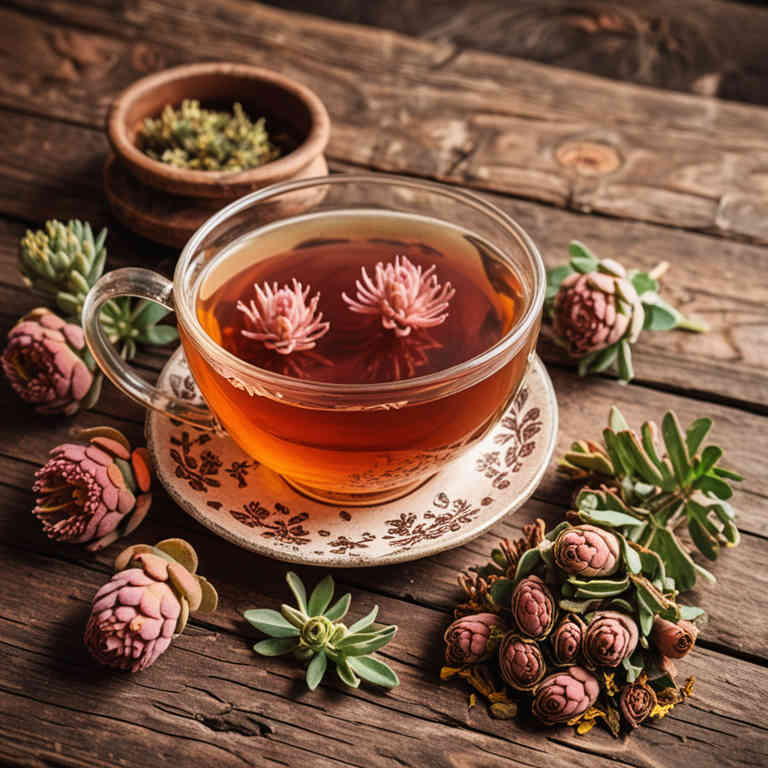Rhodiola rosea tea for medicinal use

Rhodiola rosea tea is a herbal preparation made from the roots of the Rhodiola rosea plant, commonly known as the "golden root.".
It is traditionally used in herbalism to enhance physical endurance, reduce fatigue, and support mental clarity. The tea is often consumed to help manage stress and improve overall vitality. It is believed to work by balancing the body's energy levels and supporting the adrenal glands.
Rhodiola rosea tea is popular in traditional medicine systems such as Chinese and Russian herbal practices.
Uses
Rhodiola rosea tea has been used to enhance energy, reduce fatigue, and improve mental clarity for centuries, particularly in the cold climates of Siberia, Mongolia, and the Himalayas.
Traditionally, it was revered by ancient cultures as a adaptogen, helping the body resist stress and maintain balance. In modern times, it is widely used to support cognitive function, mood regulation, and physical performance, especially among individuals facing high-stress environments. Scientific studies suggest it may help with anxiety, depression, and altitude sickness due to its antioxidant and neuroprotective properties.
As a herbal preparation, Rhodiola rosea tea continues to be a popular natural remedy in both traditional and contemporary wellness practices.
Benefits
Rhodiola rosea tea has health benefits such as enhancing energy levels, reducing stress, and improving mental clarity.
It is known to support the body's ability to cope with physical and emotional stress by regulating the release of stress hormones. This herbal tea may also help boost mood and alleviate symptoms of depression due to its adaptogenic properties. Additionally, it has been studied for its potential to improve cognitive function and increase stamina.
Rhodiola rosea tea is often used as a natural supplement to promote overall well-being and resilience.
Constituents
Rhodiola rosea tea active constituents include rosavins, salidrosides, and flavonoids, which are known for their adaptogenic properties.
These compounds help the body resist stress and support overall well-being by regulating the nervous and endocrine systems. Rosavins are believed to enhance energy levels and improve mental clarity, while salidrosides may contribute to mood stabilization and reduced fatigue. Flavonoids in Rhodiola rosea tea act as antioxidants, protecting cells from oxidative damage.
Together, these constituents make Rhodiola rosea tea a popular herbal remedy for promoting resilience and enhancing physical and mental performance.
Preparation
To make Rhodiola rosea tea, start by boiling fresh or dried Rhodiola rosea root in water for about 10 minutes.
Once the water has cooled slightly, strain the liquid to remove the plant material. You can drink the tea warm or let it cool to room temperature before consumption. It is often recommended to take it in the morning to benefit from its energizing properties.
This herbal tea is known for its adaptogenic qualities, helping to reduce stress and enhance physical endurance.
Side Effects
Rhodiola rosea tea may lead to increased energy levels, improved mood, and enhanced mental clarity due to its adaptogenic properties.
It is often used to combat stress and fatigue, making it popular among individuals seeking natural remedies for emotional and physical exhaustion. However, possible side effects include insomnia, digestive upset, and increased heart rate, especially when consumed in high doses. Some individuals may experience anxiety or restlessness, particularly if they are sensitive to stimulants.
It is advisable to consult a healthcare professional before using Rhodiola rosea tea, especially for those with pre-existing medical conditions or who are taking other medications.